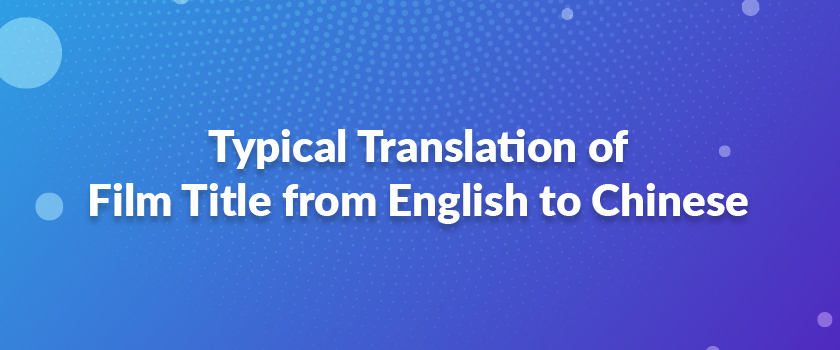Film title plays an important role on a film. With the import of numerous western films every year, the translation of film title is also significant. Firstly we know a film by hearing its title, and then judge what type it is and whether we like it according to its name.
Thus, a translation of film title should not only coincide with its content, but also meet the needs of drawing audiences’ interests and conforming to their custom and behavior. Here I would like to introduce you some typical translation of film title from English to Chinese.
Some film titles adopt literal translation which keeps the faithfulness and also shows the essence of films. For example:
Roman Holidays——罗马假日
Love Story——爱情故事
The Silence of Lambs——沉默的羔羊
America’s Sweet-hearts——美国甜心
The Sound of Music——音乐之声
Casablanca——卡萨布兰卡.
While in most cases, because of the language differences, we cannot make literal translation. We may add something or express it in another way for the understanding and acceptance of target readers. Here are some translation examples for the artistry of target text.
Gone with the Wind——乱世佳人
Top Gun——壮志凌云
Ghost——人鬼情未了
Good Will Hunting——心灵捕手
You’ve Got Mail——网络奇缘
A Walk in the Clouds——云中漫步
The Bridges of Madison County——廊桥遗梦
Read Also: The Amazing English Translation of Jay Chou’s Chinese Style Songs(Two)
For the culture differences between western and eastern, translators have to convert the film titles in other forms which are easy to understand and meaningful for Chinese. Take the famous film “Seven” as example, we know that if it is word-to-word translated, it would be “七” in Chinese. Here, most people will not understand what does it mean and think this film is boring.
While in western, “seven” means “seven sins in catholic” and it is a mystery word in religion. Thus, according to the culture background and the film plot, our translators translated it as “七宗罪”, which means “seven sins in catholic”. Apparently, this translation grasps its essence and attracts people’s attention.
Another well-known film “Waterloo Bridge”, its Chinese version is “魂断蓝桥”. This is really a beautiful but sad title which is quite closed to the film plot. However, we know that “Waterloo Bridge” means “滑铁卢桥” in Chinese. Why we choose another different translation? That’s because when speaking of Waterloo Bridge in Chinese, we can only think of the general and emperor Napoleon, which has nothing to do with the love story the film presents. And “蓝桥” is quoted from Chinese traditional Huangmei Opera “蓝桥会”, which is also telling a love tragedy. The translation “断蓝桥” perfectly combines the film content with Chinese culture together.
Another creative translation is “一树梨花压海棠”, whose English title is “Lolita”. Lolita is the name of heroin, and the film mainly tells about a middle-aged man loves his twelve years old stepdaughter. The translation is quoted from Su Dongpo (one famous Chinese poet in Song dynasty). And this poem was made for making fun of Su’s friend, who married an18 years old girl at his 80. The whole poem is as follows:
十八新娘八十郎,
苍苍白发对红妆。
鸳鸯被里成双夜,
一树梨花压海棠。
We can not deny that this is a coincidence, while we have to admire the translator’s gift. There are film titles can be translated with Chinese characteristics while keeping closed to its plot.
Take a look at how we helped our client by localizing their project for Film Industry language. Click here to read the complete case study







